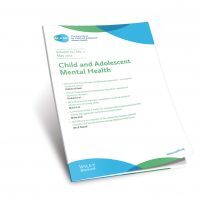Some highlights from our three journals JCPP, CAMH, and JCPP Advances. Each one of the posts below provides a link to read, and download the full paper.
Feature Papers
-

Editorial Perspective: On the need for clarity about attachment terminology
Open Access paper from the JCPP – “Part of the appeal of attachment language is that it feels near to our everyday experience, as terms like ‘attachment’, ‘security’ or ‘disorganisation’ feel readily recognisable. Yet, not one of these terms is used by academic attachment researchers in line with ordinary language”. Marije L. Verhage et al.
Read more -

Editorial Perspective: A perfect storm – how and why eating disorders in young people have thrived in lockdown and what is happening to address it
Open Access paper from the JCPP – “The number of children and young people referred to community eating disorders services escalated dramatically shortly after onset of the Covid-19 pandemic. Many presented with medical instability following restrictive eating and needed acute hospitalisation to correct malnutrition”. Dasha Nicholls (pic)
Read more -

Russian adolescent mental health in 2002, 2015 and during the COVID-19 pandemic in 2021
Paper from the CAMH journal – Cross-sectional school-based surveys of 12- to 18-year-olds were carried out in a Siberian city using the Strengths and Difficulties Questionnaire, data on tobacco, alcohol and drug use and socio-demographic information. We examined the effect of cohort, gender, family composition and parental occupation on mental health and substance use. Helena R. Slobodskaya et al.
Read more -

Contemporary screen time modalities and disruptive behavior disorders in children: a prospective cohort study
Paper from the JCPP – “This study’s objective was to determine the prospective associations of contemporary screen time modalities with conduct and oppositional defiant disorder in a national cohort of 9–11-year-old children”. Jason M. Nagata (pic) et al.
Read more -

Editorial: Schools on the frontline of suicide prevention
Free Access paper from the JCPP – “The world has experienced an unprecedented mental health crisis associated with the COVID-19 pandemic (Liu et al., 2020). After more than two years navigating the associated uncertainty and distress, the impact on youth mental health continues to be a pressing concern”. Rebecca C. Kamody and Michael H. Bloch
Read more -

Barriers to emergency department clinicians’ confidence in providing paediatric trauma-informed care
Open Access paper from JCPP Advances – “The available evidence indicates that clinicians internationally need further education and training to enhance their knowledge and confidence in providing trauma-informed psychosocial care”. Nimrah Afzal et al.
Read more -

Early manifestations of genetic liability for ADHD, autism and schizophrenia at ages 18 and 24 months
Open Access paper from JCPP Advances – “Given that ADHD, autism and schizophrenia are all highly heritable, we tested the hypothesis that in the general population, measures of toddler language development, motor development and temperament are associated with genetic liability to ADHD, autism and/or schizophrenia”. Lucy Riglin (pic) et al.
Read more -

Psychological legacies of intergenerational trauma under South African apartheid: Prenatal stress predicts greater vulnerability to the psychological impacts of future stress exposure during late adolescence and early adulthood in Soweto, South Africa
Open Access paper from the JCPP – “We evaluate the intergenerational effects of prenatal stress experienced during apartheid on psychiatric morbidity among children at ages 17–18 and also assess the moderating effects of maternal age, social support, and past household adversity”. Andrew Wooyoung Kim (pic) et al.
Read more -

Latent class analysis to characterize neonatal risk for neurodevelopmental differences
Open Access paper from the JCPP – “Neonatal risk factors, such as preterm birth and low birth weight, have been robustly linked to neurodevelopmental deficits, yet it is still unclear why some infants born preterm and/or low birth weight experience neurodevelopmental difficulties while others do not”. Allison M. Momany (pic) et al.
Read more -

Mother’s and children’s ADHD genetic risk, household chaos and children’s ADHD symptoms: A gene–environment correlation study
Open Access paper from the JCPP – “Chaotic home environments may contribute to children’s attention-deficit hyperactivity disorder (ADHD) symptoms. However, ADHD genetic risk may also influence household chaos”. Jessica C. Agnew-Blais (pic) et al.
Read more
